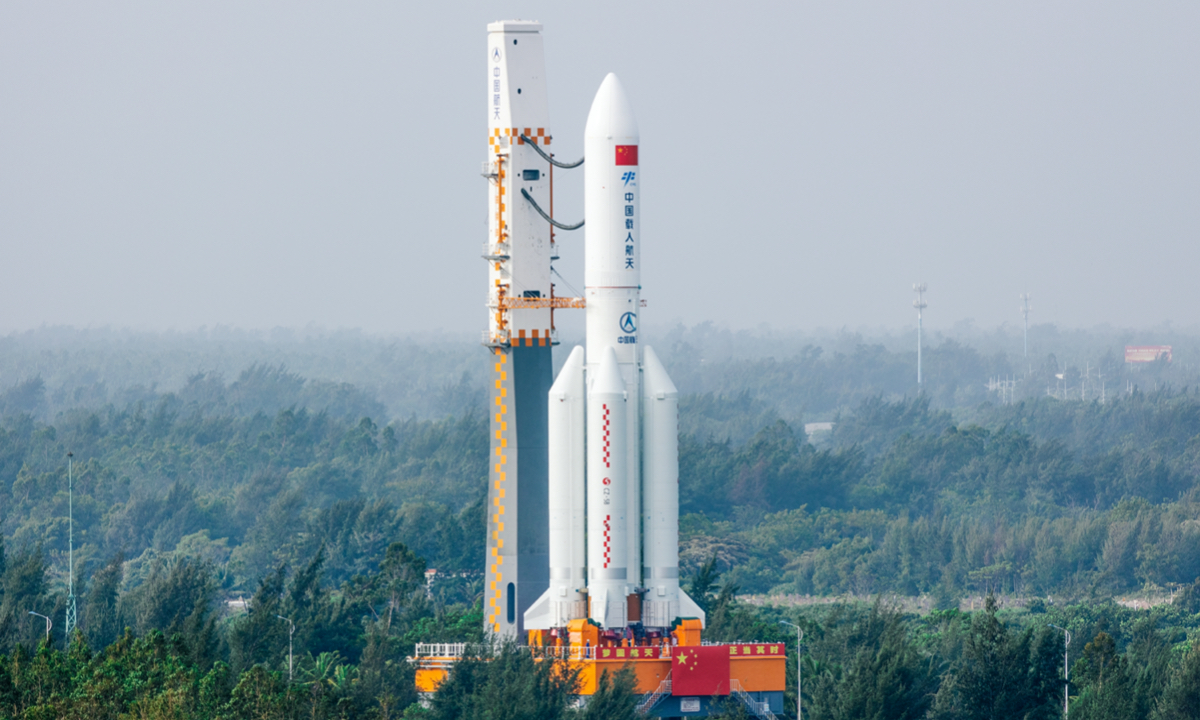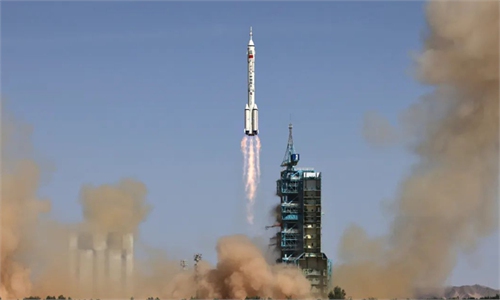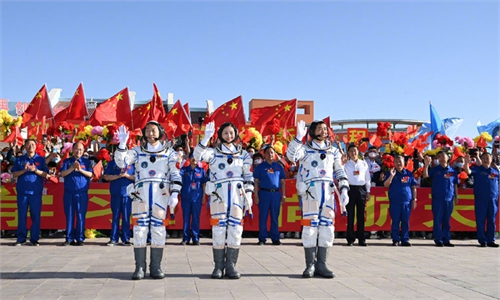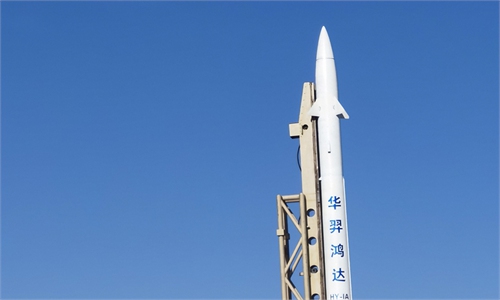Combo of rocket, Mengtian lab module rolls out to launch pad, set to lift off
Building of China Space Station near completion, consolidating space power status

The combination of the Mengtian lab module and Long March-5B Y4 carrier rocket has been rolled out to the launch pad on October 25, 2022, at the Wenchang Space Launch Site in South China's Hainan Province. Photo: VCG
The China Manned Space Agency (CMSA) said on Tuesday morning that the combination of the Mengtian lab module and Long March-5B Y4 carrier rocket has been rolled out to the launch pad, and the final part of the three-module basic structure of the China Space Station will lift off soon, the Global Times learned from the CMSA.
According to the CMSA's statement, after the roll-out maneuver on Tuesday, work including function inspection and joint testing will be carried out. All equipment and devices at the Wenchang Space Launch Site in South China's Hainan Province are in good condition, and all participating teams are stepping up preparations and making full efforts to ensure the key launch mission for the building of the China Space Station.
The Global Times learned from the Wenchang Space Launch Site personnel on Tuesday that the slogan on the transfer platform reads "it is time to fulfill the space dreams," showcasing the beautiful vision of building a "heavenly home" of the Chinese nation.
The Wenchang spaceport has overcome adversities including the lingering COVID-19 epidemic and the impact of a number of typhoons in the final 10 days of October, and made solid preparations for the upcoming launch mission, according to a statement the launch site sent to the Global Times.
The CMSA has previously disclosed that the Mengtian lab module - the third and final part of the three-module basic structure of the China Space Station - would be launched in October.
Wenchang city authorities have released an air control notice, forbidding the flight of small-scale, low-altitude and low-speed aircraft above the whole city from October 24 to November 1. Space observers speculated that the launch window would likely be before the upcoming weekend and before the lifting of the air controls.
The Mengtian lab module would be the second lab module for the China Space Station after the previously launched Wentian module, and the Mengtian will be hosting in-orbit experiments dedicated to physics and material sciences, while the Wentian focused more on biological and space life sciences.
Also, the Mengtian will carry the world's first space-based set of cold atomic clocks consisting of a hydrogen clock, a rubidium clock and an optical clock.
"If successful, the cold atomic clocks will form the most precise time and frequency system in space, which should not lose one second in hundreds of millions of years," said Zhang Wei, director of the Utilization Development Center of Technology and Engineering Center for Space Utilization under the Chinese Academy of Sciences.
The world's first cold atomic clock that operates in space was made by Chinese scientists. It was launched with the Tiangong-2 space lab in 2016, and has a margin of error of less than one second in 30 million years.
Now, through ground-based experiments, Chinese scientists have developed cold atomic clocks that are far more accurate than the Tiangong-2 version, according to Zhang.
The development of space cold atomic clock technology will contribute to higher-precision satellite positioning and navigation, and support fundamental physics research such as dark matter probes and gravitational wave detection, scientists explained.
The Global Times learned from mission insiders on Tuesday that the Mengtian module will be docking with the Tianhe core module at the front after being launched.
With 274 space launches over the past decade and great advances in various space sectors, China has become a strong space power, Wu Yansheng, a delegate to the 20th National Congress of the Communist Party of China, who is the chairman of the China Aerospace Science and Technology Corp, said on Saturday after the conclusion of the Congress.
With 2022 marking the 30th anniversary of the establishment of the country's manned space engineering project, the completion of Tiangong is a key target of the three-step strategy for the project, and an important symbol of China becoming a strong space power in the world, space watchers said.
China's Tiangong Space Station will become the true international space station with the real purpose and practice of openness, as we have been constantly inviting global partners including those from developing countries and European countries to come onboard, in forms such as foreign astronauts' joint flights or experiment payloads to be installed in the space station, Song Zhongping, a space observer and TV commentator, told the Global Times on Tuesday.
The successful launch of Mengtian and its following rendezvous and docking with the space station combination would offer a perfect period for the in-orbit building and assembly stage for the China Space Station, and henceforth the space station would become fully operational with two space labs, space observers said.
The completion of building of the space station will be a milestone in China's space technology development and drive all-around development for a variety of fundamental industries and stimulate new applications such as space breeding and new materials, Song added.




